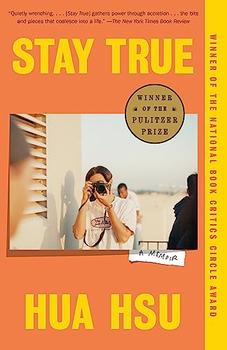Summary | Excerpt | Reading Guide | Reviews | Beyond the book | Read-Alikes | Genres & Themes | Author Bio

A Memoir
by Hua HsuThe title of Hua Hsu's requiem-like memoir, Stay True, captures the essence of its contents. The phrase refers to an in-joke between then-undergraduate Hsu and his friend Ken, who was later murdered — an event that had an enduring impact on the author.
With the help of his journals from the time, New Yorker staff writer Hsu recounts his college years at Berkeley, and then Harvard. Born in 1977, Hsu is a Gen-Xer who reached college age in the 1990s, a decade that calls to mind fax machines, grunge rock bands like Nirvana and the early days of the internet. Period details permeate this memoir, and become an organic component of the writer's experiences, drawing readers into his world.
The son of Taiwanese immigrants, Hsu spent his early college years exploring his sense of self and feeling out his niche. Spending much of his time in record stores around the San Francisco Bay area, music became a way of seeking meaning and articulating identity. He says at one point, "I judged people by their CD collections" — the subtext being that identity can be consciously constructed by collecting music that is associated with a particular social group. In other words, it was possible to "choose who you wanted to be." This notion of defining oneself through music highlights the importance of finding one's place in the world. While the pursuit of identity is a goal for most young people, Hsu's status as a second-generation immigrant adds another layer of complexity to his quest.
This fragmented sense of self also becomes manifest through Hsu's burgeoning interest in zines (see Beyond the Book); their eclecticism and subculture vibe ooze a desire to eschew all things mainstream and forge a unique persona. Poignantly, he declares that zines were "a way to find a tribe." This introduces a dilemma: how to fit in yet remain unique. Hsu's retrospections resonate — many of us have gone through similar stages in life.
Hsu delivers his recollections in a style that is both journalistic and intimate. It is a style that comes into its own when covering his friendship with Ken. Initially, Hsu finds Ken "too loud for life" and says he "hated him." Also of Asian descent, Ken has fully assimilated into American culture when they meet at Berkeley, unlike Hsu. With his penchant for Abercrombie & Fitch, Pearl Jam and smoking, Ken is thoroughly mainstream and, in Hsu's eyes, indistinguishable from the crowd — a stereotypical "frat boy." And yet, a bond develops. Ken becomes a permanent fixture in Hsu's life, establishing a friendship characterized by everyday college interactions, regular car journeys and late-night conversations while puffing on cigarettes. Hsu discovers hidden depths in his friend that he hadn't previously acknowledged. Ken becomes so knitted into the fabric of Hsu's life, and that of their peers, as to function as an essential limb of their collective body.
So when Ken's body is discovered one July morning, the victim of a carjacking and fatal shooting, the impact is cataclysmic. The positioning of this event within Hsu's narrative is symbolic in that it occurs around the halfway point. The tragedy splits Hsu's life in two — the before and the after — and reflects the central role Ken played in his life. Hsu becomes increasingly introspective, although this brings him no closer to "fathoming darkness." The second half of the narrative places much emphasis on his difficulty in coming to terms with the aftermath of tragedy.
Ultimately, Stay True is also a book about writing. Hsu turns to journaling his thoughts and experiences in the wake of Ken's murder, and while the purpose of this was probably more to do with working through his grief than for posterity, his journals clearly became an invaluable source for this narrative. That the end result is this memoir suggests that Hsu did find some form of catharsis in the writing process, and in sharing his exploration of friendship, loss and selfhood. His writing is understated, a style that is the perfect vehicle for the content but may not be to every reader's taste. Likewise, the musical references that pepper this memoir are a strength in that they provide rich cultural detail, but, to a certain degree, they rely on the reader's familiarity with the references for their full impact to be conveyed. Nevertheless, Stay True is a visceral, honest memoir with the potential to connect with a wide readership.
![]() This review was originally published in The BookBrowse Review in November 2022, and has been updated for the
October 2023 edition.
Click here to go to this issue.
This review was originally published in The BookBrowse Review in November 2022, and has been updated for the
October 2023 edition.
Click here to go to this issue.

If you liked Stay True, try these:

by Haley Mlotek
Published 2025
An intimate and candid account of one of the most romantic and revolutionary of relationships: divorce.

by Sarah Moss
Published 2024
An unflinching memoir about childhood, food, books, and our ability to see, become, and protect ourselves.
Your guide toexceptional books
BookBrowse seeks out and recommends the best in contemporary fiction and nonfiction—books that not only engage and entertain but also deepen our understanding of ourselves and the world around us.